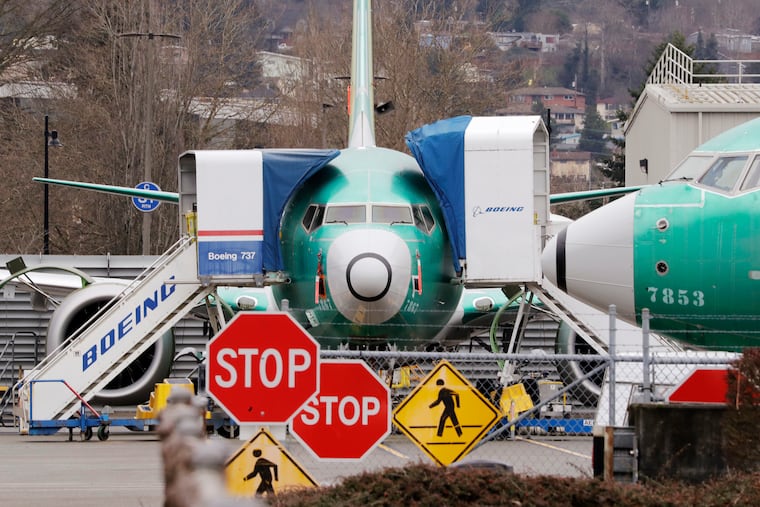After Wawa, Boeing headlines, the question of ethics leads to a St. Joe’s warrior named Tim Swift | Maria Panaritis
You’re not dreaming: It’s uglier than ever out there in the business world, says a guy who would know.

The fact that Tim Swift was driving to volunteer at a Philadelphia soup kitchen when we got on the phone Tuesday afternoon should have been the biggest clue: I was talking to a 53-year-old professor of management who isn’t your stereotypical former corporate telecom and computer-world guy.
This was a former AT&T and Unisys Corp. manager who, after 14 years, is now a Ph.D., a St. Joseph’s University Haub School of Business professor. He is no apologist, in the name of capitalism, for bad behavior. He is morally outraged about the way too many companies are being led with little accountability or moral focus.
And he minces zero words about it.
“I can tell you stories,” the head of the school’s business ethics center told me about the 14 years he spent in corporate management.
Two stories that made headlines last week were, in fact, the reason I had found him at all. They were very different in scope — one, about the Boeing Co., under fire after two airline crashes killed hundreds of jet travelers. The other, about Wawa, involved an unsavory financial dispute between former employees and the company’s founding family.
Wawa, according to a piece last week in The Inquirer, is being sued amid allegations that it reneged on a promise that cost former workers millions in company stock. Wawa previously paid out a $25 million claim, two years ago, while acknowledging no wrongdoing. This was a company I had recently praised for its reputation of treating employees relatively well.
» READ MORE: Wawa founding family accused of cheating former workers out of millions in company stock
Recent reports about Boeing went beyond questions of good faith between an employer and its workers. They painted a portrait so morally reprehensible that it makes hundreds of deaths in two crashes of its flawed 737 Max jet all the more sickening.
As the Washington Post reported, internal communications revealed conversations in which, in one instance, an employee described the jet as “designed by clowns, who are in turn supervised by monkeys.” You got the sense that the company valued cost containment at all costs.
“Would you put your family on a Max-simulator trained aircraft?” one pilot asks, then answers himself: “I wouldn’t.” His colleague agreed, according to the Post.
Adding insult to it all, fired Boeing CEO Dennis Muilenburg walked away from this corporate dumpster fire he had overseen with at least $62 million as a parting gift. This became public last week on the very same day that workers at one of the Boeing Max jet’s key suppliers sent layoff slips to 2,800 employees.
I’m not feeling all that great, I told the fair professor, about the idea of business ethics.
I expected him to reply with a set of it’s-not-as-bad-as-you-think corporate talking points. Instead, I got what only a man who runs the Pedro Arrupe Center for Business Ethics at a Jesuit university would deliver.
“You’re not crazy to feel or sense that there is a decline in ethics in the industry,” Swift said. “And if you want to blame us as educators in business ethics, I don’t blame you. For the average working family, the climate has been toxic — and it’s getting more toxic.”
He hadn’t yet read the piece on Wawa (company officials had declined to comment in colleague Joe DiStefano’s original story). But Swift had formed strong impressions about the mess at Boeing.
“I do have the general sense that Boeing really was negligent in moving that aircraft forward and in ignoring a lot of warnings,” he said.
He was not shocked.
“It’s not the first time that I’ve seen such a really surprising lack of consideration of ethical issues and social justice,” said the South Jersey native. “...To take chances when so many lives were at stake was very sad.”
It’s all too typical in companies nowadays. The people in charge are given extraordinary, almost-celebrity-like power by the boards that oversee them. In a study that Swift said he cites liberally since it came out in the early 2000s, researchers found that even when highly influential board members seek to challenge the status quo, they are shunned by other corporate elites.
What you end up with is top brass — managers and their supposed watchdogs — living by this “unwritten code of conduct,” he said. They have all the decision-making power as labor and other stakeholders have been marginalized by federal law since the 1980s, and you end up with this: “The ethical climate in American business is in decline,” Swift said.
There is, however, a silver lining.
It’s called bad publicity on social media.
“When a CEO messes up,” Swift said, “they’re getting fired a hell of a lot faster than they used to. That is not explained by anything in our economy. ... Company profits are skyrocketing. Our science suggests that the reason that CEOs are being fired more frequently is the transparency that’s being forced onto our corporations by social media.”
Swift is a capitalist with a conscience. Let’s take him at his word and demand better.